
Ten things to know before you volunteer in Thailand
Zaytoen Domingo
Posted: February 28, 2020
Thailand’s ancient ruins, Buddhist temples, tropical beaches, and opulent royal palaces make it one of the most intriguing destinations in Southeast Asia. Here are ten interesting things to know before you set off to volunteer in Thailand.
The food, the beaches, the temples: there are dozens of reasons to love Thailand. But you’ll love this southeast Asian country even more when you visit as a volunteer.
Volunteer opportunities in Thailand are a meaningful way of getting to know more about this country, and going beyond the typical tourist experience.
To help prepare you for and get the most out of your trip, here are ten things it’s handy to know before you volunteer in Thailand.
1) Skip the elephant rides and choose to see them in the wild instead
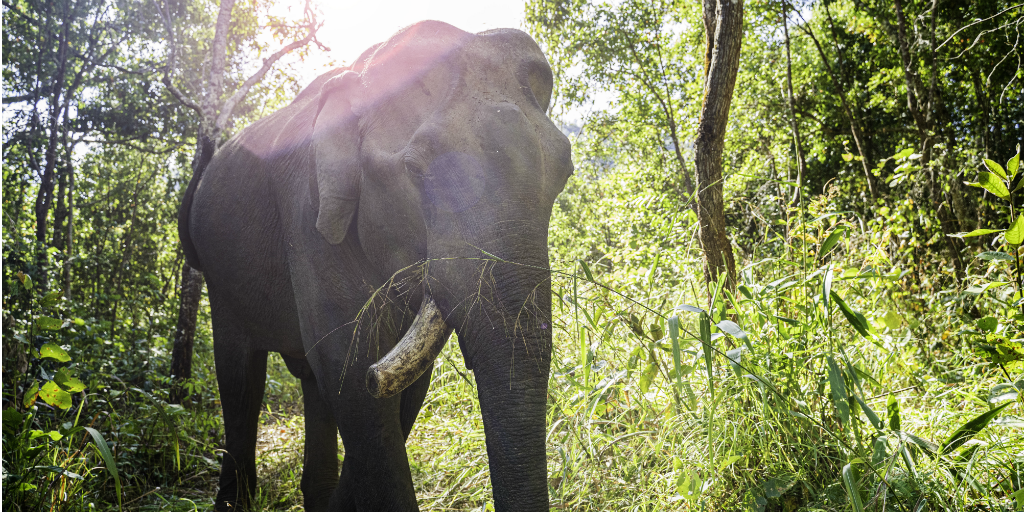
Interacting with elephants has been considered a quintessential Thailand experience for several decades. Elephants first entered the tourist trade in Thailand after logging was banned in 1989 and the animals and their keepers had to find alternative sources of income.
Although elephant parks and sanctuaries are still popular, many do not follow best practice when it comes to the welfare of the elephants. To support elephant welfare and sustainable tourism, choose your elephant experiences carefully.
Any activities that involve close contact with elephants, such as riding, bathing, or feeding them, are unethical.
Skip the rides, and choose responsible volunteer work with elephants in Thailand instead.
GVI offers an opportunity to volunteer with elephants Thailand in a way that is ethical and sustainable. This project works toward reintegrating elephants from the tourism trade into a more natural environment.
You’ll be able to observe and study elephants in their natural habitat, and contribute to the establishment of an eco-tourism model. This is a much more meaningful experience than witnessing them in captivity.
2) Thailand is the perfect place to learn how to scuba dive
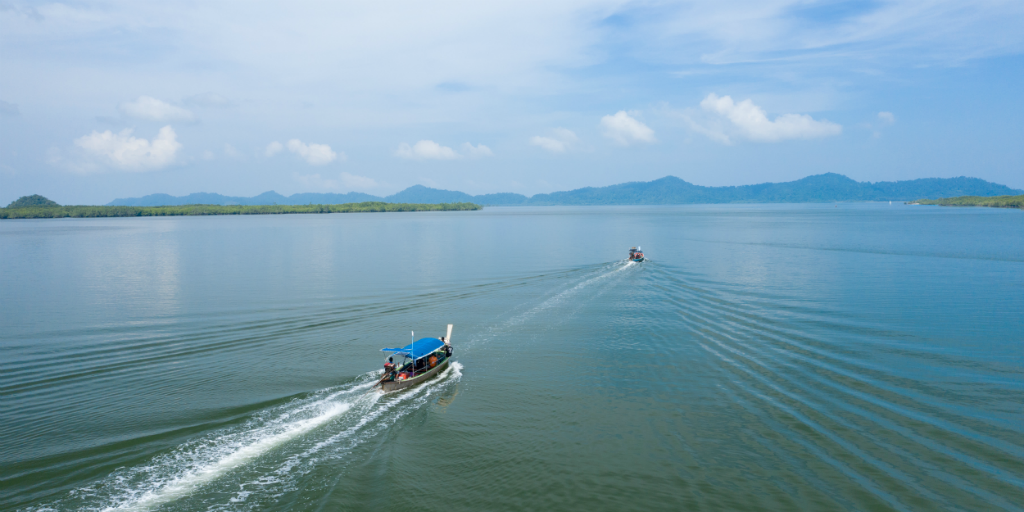
Thailand’s islands are a playground for dive enthusiasts.
If you don’t have your PADI certification, you can learn how to dive, or gain the next level dive qualification while in Thailand.
Perfect conditions give you the opportunity to discover a whole underwater world. With clear, warm waters, an abundance of marine wildlife, and affordably-priced dive schools, Thailand is the perfect place to gain scuba diving skills.
If you’re interested in exploring and protecting Thailand’s underwater world, consider volunteering in coral reef research and conservation.
Or, get your PADI Divemaster with GVI, becoming a dive professional while learning more about coastal and marine conservation at the same time.
3) Learn more about Buddha, but don’t try to take statues home
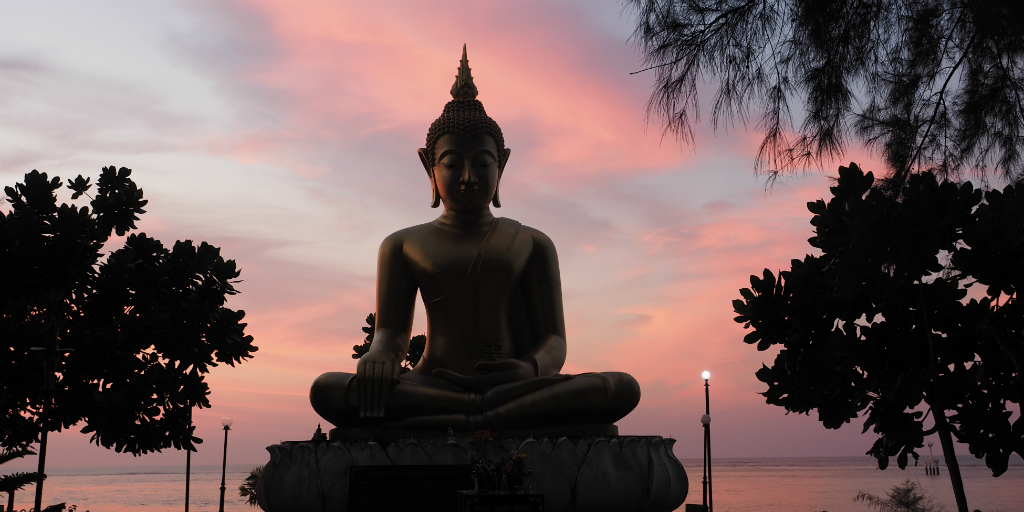
Buddha is everywhere in Thailand.
But make sure you respect the Thai etiquette of how to behave around Buddha figures. For example, when viewing Buddha statues in a temple, back away a short distance before turning around, don’t point at Buddha, and don’t raise yourself higher than a Buddha image.
It’s also important to know that you can’t take buddha statues out of the country with you unless you have a special licence. So skip buying Buddha statues as souvenirs.
4) Eat with your spoon

Whether you volunteer in Chiang Mai, Thailand, or in Phang Nga, you’ll notice that you’ll be given both a fork and a spoon to eat with.
Never put the fork in your mouth. Use the spoon to eat with, while using the fork to push food onto it. This is the proper way to enjoy delicious Thai food.
Putting a fork in your mouth is akin to licking your knife in many cultures. It’s considered bad table manners.
5) Smiles are one of the easiest way to communicate in Thailand
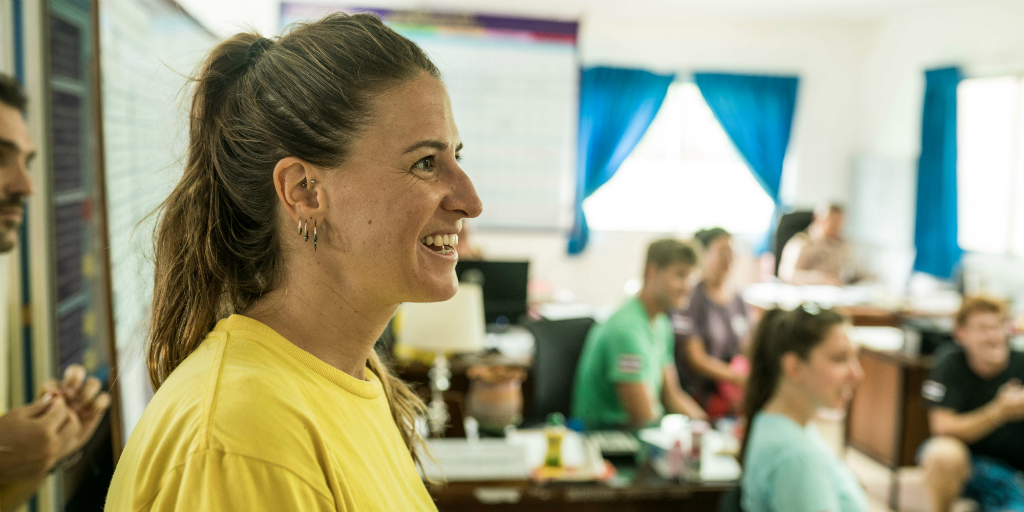
Saving face and smiling through any situation is important to Thai people. Showing emotions such as anger and anxiety in public is generally frowned upon.
Whether haggling in a market, negotiating busy streets, or taking crowded public transport, remember to always keep your cool and smile often. This is the simplest way to show respect and connect with Thai people.
6) Take off your shoes
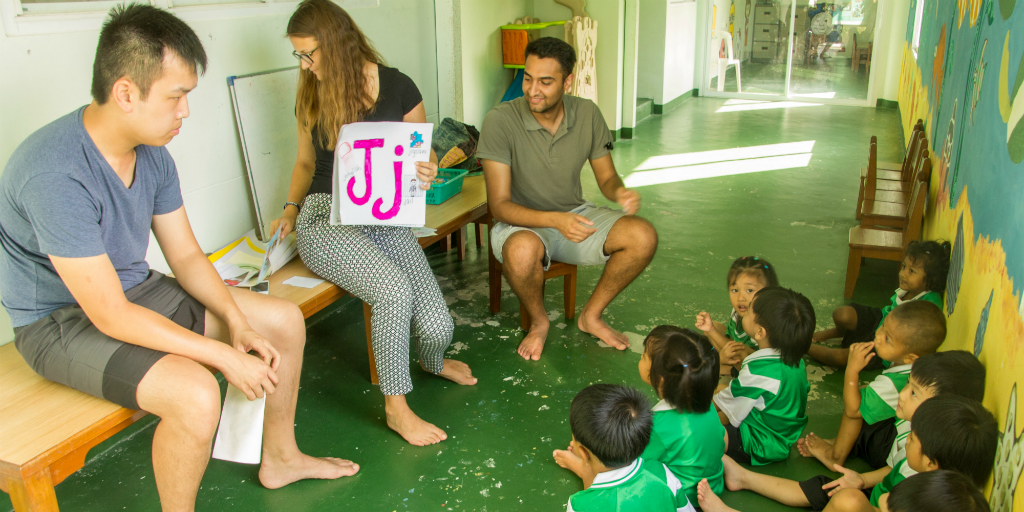
Removing your shoes outside temples, as well as many homes and businesses such as restaurants and shops is the norm in Thailand. As a rough guide, if there is a pile of shoes outside the entrance, you should probably take your shoes off.
However, after removing your shoes, be careful not to show the soles of your feet if you’re sitting on the ground. The feet are considered the dirtiest part of the body so it’s rude to point with them or put them on a desk or chair.
4) Show respect with a wai
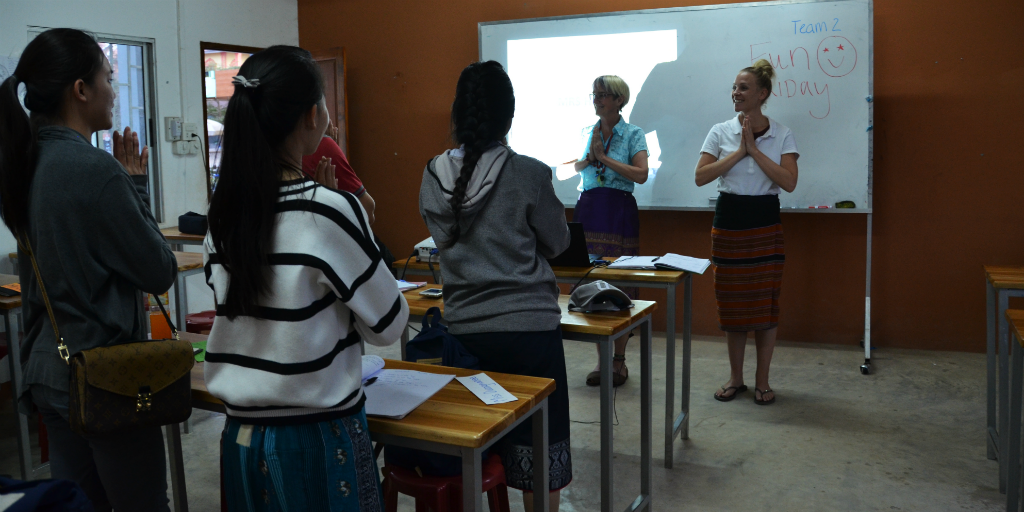
Volunteer projects in Thailand are a great way to learn more about the culture of the country. You’ll be more integrated into local communities and have the chance to observe and participate in Thai customs.
One of the most important customs, and easiest for you to adopt, is greeting people with a wai. This means bringing your hands together and bowing slightly.
Not returning a wai is considered impolite. Only the king and monks do not have to return the gesture.
6) Don’t insult the king
In Thailand, it is illegal to defame or insult the royal family.
The respect Thai people have for their king is clearly visible. You’ll quickly start to spot photos of the king everywhere.
The late Thai king, who died in 2016, is a God-like figure who was mourned for a year after his death. Be careful to avoid saying anything negative about him. If you’re feeling uncertain about this, it’s safest not to discuss the king at all.
9) Take note of the important dates
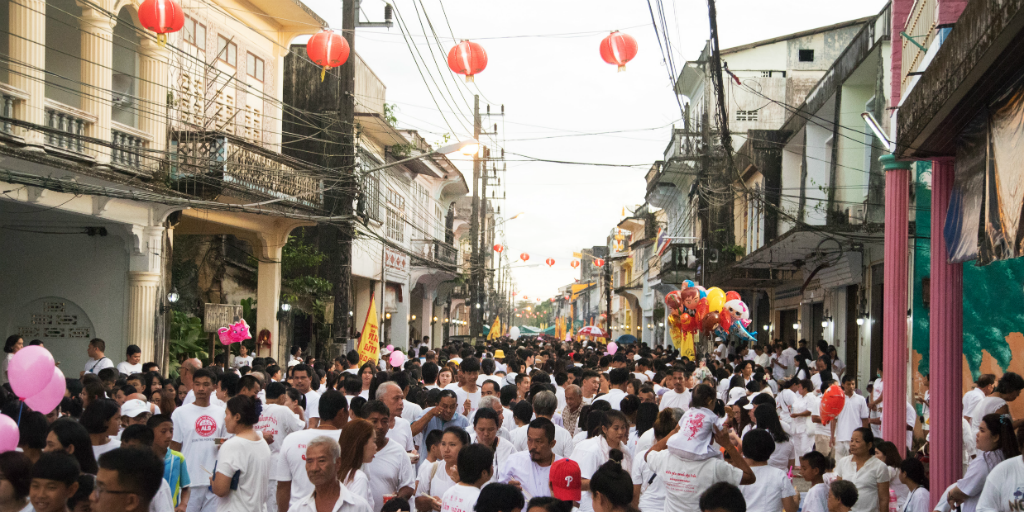
If you time your volunteer work in Thailand well, you’ll be able to take in some of the cultural festivals celebrated around the country.
The biggest one is Songkran, Thailand’s most famous festival, which takes place between 13 and 15 April. This is the Thai New Year and a national holiday that celebrates new beginnings with the cleansing properties of water. Essentially, the whole country celebrates with a massive water fight.
Yi Peng, the Lantern Festival, is another spectacular celebration which takes place in Chiang Mai in November. During the festival, paper lanterns are released into the night sky to represent letting go of any misfortunes from the past year.
One important thing to note is that the lanterns are not always biodegradable, and the large number released into the sky can end up polluting surrounding towns, waterways, and fields. So while it may be stunning to watch, you can opt out of releasing your own lantern to avoid adding to the waste.
Loi Krathong, also known as the festival of light, takes place at the same time as Yi Peng. It is an equally photogenic event, where banana leaf boats are decorated with flowers and candles and sent sailing down waterways. The festival celebrates the end of the rainy season, and is a chance for people to give thanks to the goddess of water.
If you volunteer in Phang Nga, you can also commemorate the Boxing Day Tsunami with a visit to the memorial site on 26 December. The 2004 tsunami killed more than 5,000 Thai people and visitors to Thailand, with thousands more reported missing. Ban Nam Khem, where the memorial is located, was the hardest hit town in Thailand.
10) Escape the crowds and find the quiet spots
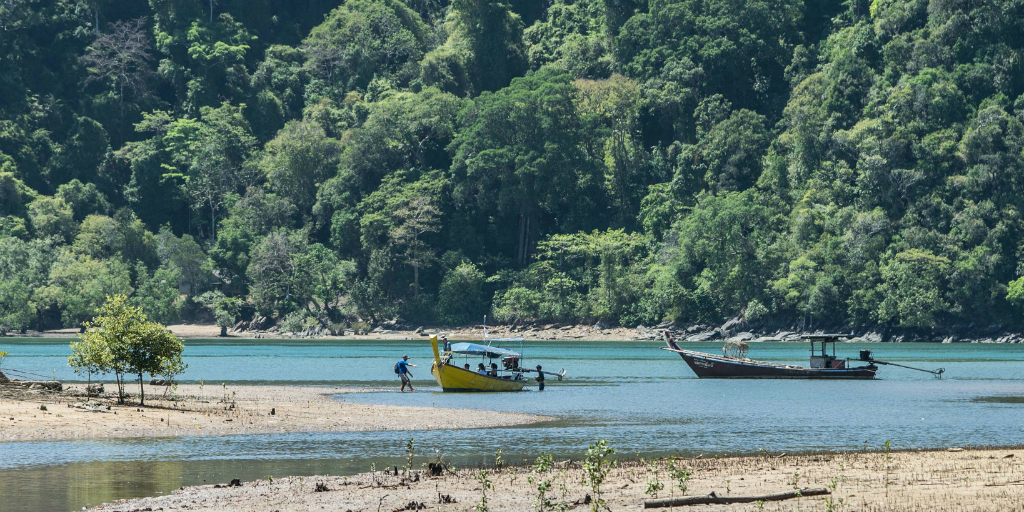
Thailand is a popular tourist destination, so you won’t be the only visitor around. In 2018, a record 38.27 million tourists visited Thailand.
The most popular destinations in Thailand, such as Phuket and Krabi, can get crowded with tourists.
For a quieter experience where you can have more chances to connect with local people and culture, volunteering is a great option. Get off the beaten track in places like Ban Nam Khem, on the coast of Phang Nga, or in the lush mountains in northern Thailand.
Living at GVI’s volunteer bases is a more immersive experience than simply visiting as a tourist. Included in your program will be training on Thai culture and etiquette, so you’ll be better equipped to travel with respect and enjoy Thailand’s quieter corners.
Experience Thailand volunteer programs with GVI. Browse our range of projects in public health, conservation and community development today.
By Zaytoen Domingo
